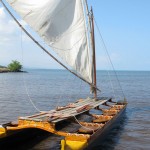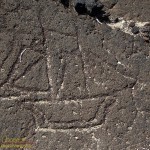What is modern? What is traditional? What is different about these two words and what they mean? Is there any real difference? I would argue that there is not and never has been any real difference, except in the minds of those who want to see it. A sort of golden age idealism, that somehow things were better back whenever.

We are human, ancient humans were far more modern than many seem to envision. Many think of the past and see some cartoon version of people who are somehow less than we are today. A view of the past created by so many movies, so many bad historical melodramas.
If one were able to stroll down a street in ancient Rome you would see a city every bit as complex as a modern metropolis. All of the people you would meet completely recognizable in their roles. No cars or electric lights, but there are police and politicians, barbers and butchers, a world quite similar to our own.
Ancient societies were sophisticated, their personal relationships much the same as today. Our friends and fellow citizens of this modern age are more ancient than we often realize, acting from the same motivations, the same desires. Humanity has not changed that much. Our technology is changing rapidly, we do not change nearly as quickly.
Modern science and technology can trace its roots all the way back into the traditional systems that supported civilization across the globe in the past. The old knowledge that works has been preserved and built upon. While dis-proven ideas are hopefully cast aside. The progression of knowledge is often the only distinction between the past and our modern world.
The problem is that it has become vogue in some circles to prowl through the rubbish of past civilizations and resurrect ideas that seem cool and interesting. I suspect it is primarily a reaction to the complexity and confusion of modern life. People are grasping for anything that can explain an ever more inexplicable world. Some of the old ideas are simple and comforting, even if the comfort is false
Consider electronics… As an electrical engineer I understand the basis of the technology, but the complexity of the latest generation of devices is stunning. Consider a common tablet computer, able to record and display video, to retrieve information from the far side of the globe. These everyday devices have become essentially magic to many people who can not begin to grasp what makes them work.
Many people yearn for simpler answers, a simpler way of life. I can understand that. A life without cell phones and email would be far less hectic. Are you ready to give up the convenience that they bring? To return to a world where it took months to learn of a birth or death in a family a continent away? Few would willingly give up the advantages of modern technology. Easy living, far better healthcare, longer lives brought by the absence of the grinding work of simple survival.
Another myth is the belief that ancient peoples somehow lived in harmony with nature. Again a closer look at the past shows this to be largely false. Our ancient ancestors simply managed to do less damage because their technology and numbers were limited.
Still, they did harm. There are countless examples of native peoples creating massive ecological damage to their local ecosystems. The disappearance of the Ancestral Puebloans, the collapse of the island ecosystems of Rapa Nui, the silence of the Mayan ruins.
The ecological holocaust that occurred soon after man first stepped ashore in the Hawaiian islands was far more extensive than many realize. Dozens of flightless birds extinct, two species of ground crab, massive areas of native forest cleared. Dogs, pigs and rats creating the doom of a unknown number of species of plants and invertebrates. The records of the first European ships to visit the islands give vivid accounts of the amount of cleared land in cultivation, far more than we see today in many places.

Some cultures managed to mitigate the damage, hard lessons taught by starvation and plague. Island ecosystems were particularly severe, limited space making those lessons all the more obvious, more important to learn. A balance could be struck, population limited by the available resources and stringent rules governing the use of resources. Such ecosystems were massively modified by the human inhabitants, adapted to the needs of man, the endemic plant and animal communities pushed aside.
This is not to entirely discount traditional knowledge. Centuries of experience is embodied in that knowledge. Unfortunately this knowledge is mixed with centuries of random folklore, sorting the gems from the chaff is challenging. Much of the value has long been extracted, the foundation for modern science and culture. What remains of value is increasingly rare. I find myself repeatedly amazed at those who claim that there are ancient secrets that will solve everything. There might be a bit of useful knowledge here and there, by and large the really useful information is still with us, incorporated into what we call modern.
As humanity moves through the ages it is only the body of our knowledge that increases. Our understanding of the world around us and of who we are is better, for those who care to learn. New ideas have taken hold that offer a glimpse of a better future, built atop the hard won lessons of our past. Human rights, equality, the abandonment of the old superstitions in favor of science to explain our world. Our understanding of the environment increases, but so too does our capacity to do harm. Our increasing population demanding ever more resources to support.
The terms traditional and modern are useful, they serve as a reference to the past and current. While there are differences between us and our ancestors, they are not as great as many believe. We are still human, our culture is much the same as it has been for millennia. It is important not to romanticize the past, while at the same time learning from our past.


The best howler I’ve heard is : “There was no bacteria in Ancient Hawaii. Corpses did not decay until bacteria were introduced by Whites”.
Only off by about 3.5 billion years.